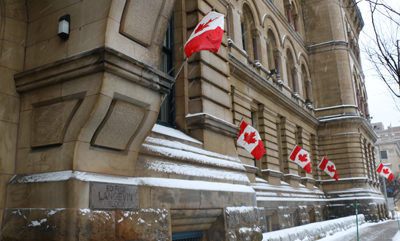Case Studies Collection: the PMO, the Star, the Advance and the “whole off-the-record-thing”
An email from the prime minister’s office offered a story with strings attached. For two Ontario journalists, the conditions seemed unreasonable.
Inspired in part by the Columbia Journalism School’s Case Consortium, Ryerson University’s School of Journalism has been compiling a database of studies on ethical dilemmas in Canadian journalism since 2012.
Part ethics exercise and part curriculum resource, the case studies have been highlighted on J-Source in the past, regarding coverage of former Toronto mayor Rob Ford and his family in 2013. In an ongoing series, we’ll be highlighting some more of those cases here as they become available.
[[{“fid”:”3978″,”view_mode”:”default”,”fields”:{“format”:”default”,”field_file_image_alt_text[und][0][value]”:””,”field_file_image_title_text[und][0][value]”:””},”type”:”media”,”link_text”:null,”attributes”:{“height”:”241″,”width”:”400″,”style”:”width: 300px; height: 181px; margin-left: 10px; margin-right: 10px; float: right;”,”class”:”media-element file-default”}}]]
On June 17, 2013, the Prime Minister’s Office (PMO) had a story they wanted Canada’s media to tell.
Media representatives from the PMO reached out to dozens of publications claiming they had documents that were unflattering to Liberal leader Justin Trudeau. Trudeau had a long history of doing paid speaking engagements across Canada, including a fundraising event for a seniors’ facility in Saint John, N.B., and a local community college in Barrie, Ont. The only catch was the PMO wanted to be listed as an anonymous source in any stories written on the documents. This was a bizarre position for reporters of any political stripes to be put in for a number of reasons.
Within hours of being contacted, Toronto Star’s senior political writer Susan Delacourt and Barrie Advance news reporter Laurie Watt, both journalists with careers that spanned decades, produced two completely different stories.
This case study follows each of the two journalists—one in Canada’s largest big-city paper, the other in a small city just an hour’s drive away—as they decide how to deal with the uncomfortable position imposed on them by the Prime Minister’s staff. At its heart: what does “off-the-record” mean when the source is the most politically powerful office in the land?
To read the rest of this case study, please head to the Case Studies Collection, where it was originally published.
Because these case studies are intended primarily as a teaching resource, a password is required to view the epilogue of each case. The purpose is to encourage readers to pause and think about how they would resolve the difficulty, without knowing how the journalist(s) involved did so. Password access will be provided to any teacher, or to others for information, with a request that the epilogue not be republished. Copyright on each case study is owned by its authors. Copyright on the compilation as a whole: Ryerson University, 2014.

